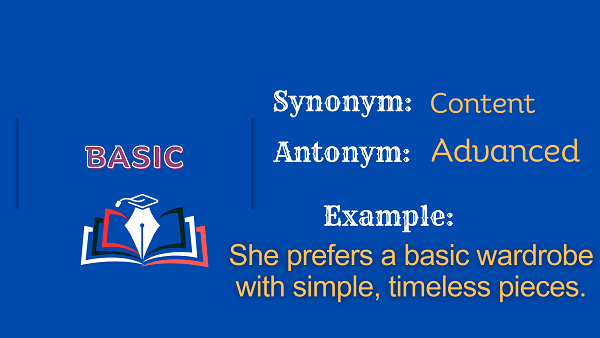
Basic - Definition, Meaning, Synonyms & Antonym
Basic meaning refers to something fundamental, essential, or elemental, often used to describe foundational knowledge or simplicity.
History of the Word Basic
Early Usage
The word basic finds its origins in the Latin word basicus, meaning about a base. In Middle English, it refers to foundational principles, such as basic arithmetic.
Renaissance Era
During the Renaissance, it was used in the context of alchemy and chemistry to describe substances that were fundamental or primary. For example, basic salts were considered essential components.
20th Century Usage
In the 20th century, basic gained broader usage to describe fundamental principles, concepts, or elements across various fields. It became a common term in education, referring to essential knowledge and skills.
Pop Culture
In recent decades, it has taken on a more colloquial and sometimes pejorative meaning, often used to describe someone who adheres to mainstream trends and lacks originality or depth.
English (Basic As Adjective)
Etymology
From Latin basicus, meaning pertaining to a base or fundamental.
Pronunciation
Pronounced: /ˈbeɪsɪk/ (BAY-sik)
Basic as Adjective
| Adjective | basic |
| Comparative Degree | more basic |
| Superlative Degree | most basic |
| Adverb | Basically |
| Noun | Basics |
Derived Terms
- Basically
- Basics
Translations of Basic
- Spanish: Básico
- French: Basique
- German: Grundlegend
- Italian: Di base
- Portuguese: Básico
- Chinese (Simplified): 基本的 (Jīběn de)
- Japanese: 基本的な (Kihonteki na)
- Basic meaning in Hindi: मूल (Mool)
- Urdu: بنیادی (Buniyadi)
- Russian: Базовый (Bazovyy)
Synonyms
- Fundamental
- Essential
- Primary
- Simple
- Elementary
- Foundational
- Core
- Rudimentary
- Underlying
- Baseline
Antonyms
- Advanced
- Complex
- Sophisticated
- Complicated
- Elaborate
Examples Sentence
- Understanding basic mathematics is crucial for daily life.
- The basic principles of cooking include heat and ingredients.
- She prefers a basic wardrobe with simple, timeless pieces.
FAQs about Basic
What does basic mean?
It refers to something fundamental, essential, or elemental, often used to describe foundational knowledge or simplicity.
Can basic have a negative connotation?
While basic is often neutral, it can take on a negative connotation when used to describe someone who adheres to mainstream trends and lacks originality.
Is basic commonly used in education?
Yes, basic is frequently used in education to describe essential knowledge and skills that form the foundation of more advanced learning.
Are there synonyms for basic?
Synonyms include fundamental, essential, elementary, foundational, and rudimentary.
Can basic describe both concepts and individuals?
Yes, it can describe both fundamental concepts or principles and individuals who possess or adhere to basic qualities or characteristics.
Related Content:
- Married
- Marked
- Marine
- Marginal
- Marbled
- Manicured
- Entities
- Dismal
- Camouflaged
- Callous
- Awe-inspiring
- Dalmatian
- Dreary
- Attentive
- Barefoot
- Agile
- Blissful
- Assertive
- Artistic
- Audacious
- Satisfying
- Gratifying
- Enchanting
- Enjoyable
- Abloom
- Affable
- Marginal
- Marbled
- Marine
- Broken
- Clever
- Amusing
- Main
- Magenitized
- Dazzling
- Dependable
- Drowsy
- Considerate
- Caring
- Composed
- Horrible
- Miserable
- Unenjoyable
- Society
- Folk
- Dainty
- Gauzy
- Gay
- Gathered
- Garden
- Gangly
- Facetious
- Facile
- Faltering
- Faded
- Calculated
- Ecumenical
- Daily
- Daft
- Exalted
- Dynamic
- Devoted
- Euphoric



